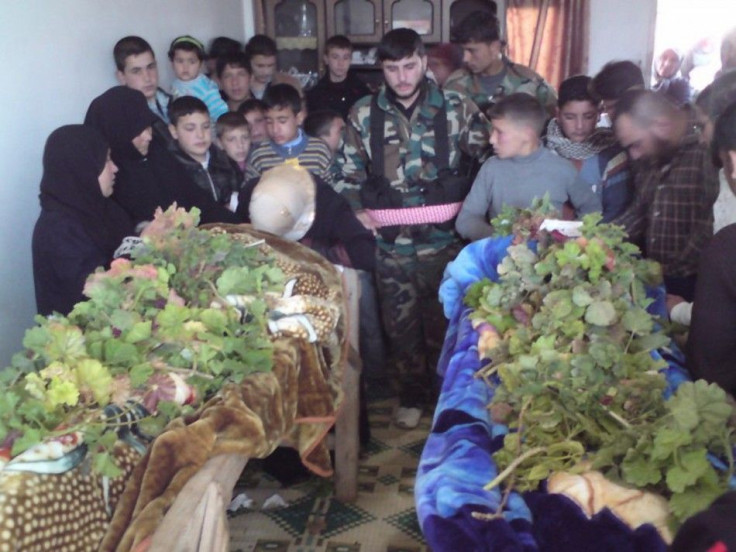Syrian Opposition Shows Splits; Homs Shelled Anew

Syrian opposition activists gathered in Istanbul to endorse a program for political change to unify their movement, but the conference proved divisive even before officially opens Tuesday.
The planned agreement, to be signed Tuesday, follows a flurry of efforts by the opposition Syrian National Council to win international confidence for efforts to oust President Bashar al-Assad, the Wall Street Journal reports. Dissidents are trying to present a more united face ahead of a meeting Sunday of the Friends of Syria, a contact group that brings together representatives from 70 countries and the United Nations.
A rival to the SNC boycotted the meeting, while other opposition groups complained that hosts Turkey and Qatar were undermining the U.N.-Arab League effort to end the crisis.
That initiative, led by former U.N. Secretary-General Kofi Annan, has moved on a separate track from the Friends of Syria, which was formed to work around the U.N., where Russia and China were blocking moves against the Assad regime.
Annan's initiative is focused on negotiating with Syria's government on a six-point plan to end the violence. The plan doesn't address a call adopted by the first Friends of Syria meeting for Assad to step aside.
The Annan plan was endorsed by the U.N. Security Council last week with the consent of Russia and China. Annan is studying a Syrian response to the plan, and will answer shortly, said Annan's spokesman, Ahmad Fawzi. Annan will be represented by his deputy at the Friends of Syria meeting, Fawzi said.
Annan on Monday raised the possibility of U.N. observers entering Syria to enforce an agreement. He said that he hoped the hostilities could cease very shortly, and in that case, We will have to be on the ground to monitor and ensure that all sides are respecting the agreement.
Annan was speaking in Moscow after meetings with Russian President Dmitry Medvedev and Foreign Minister Sergei Lavrov, before departing for China. I had very strong support here in Moscow for the six-point plan and expects similar in China, he said.
Meanwhile, Turkey and Norway closed their embassies in Syria Monday, further isolating Assad, whose forces bombarded the battered city of Homs with mortars in an effort to quell unrest, Reuters reported.
Video showed towering flames and thick black smoke billowing from at least two locations in Homs, Syria's rebellious third-largest city. Residents accused the army of indiscriminate shelling.
Every day the shelling goes on. The regime is wiping out the city, said Waleed Faris, an activist who lives in Homs.
Sixteen people died in clashes around the country, the British-based Syrian Observatory for Human Rights said, with eight dying in Homs. Two of the dead were children, the group said.
Following the example of many Arab and Western states, Turkey said it had suspended all activities at its embassy as the security situation worsened.
Norway also announced it was closing its embassy.
Once a close ally of Assad, Turkey has denounced his efforts to crush the rebellion and has thrown its weight behind his opponents, announcing on Sunday that it would work with Washington to provide non-lethal aid to the Syrian opposition.
The Syrian National Council, which was formed in September, is seeking recognition as the sole representative of the opposition and, eventually, the only legitimate representative of the Syrian people. The SNC was recognized in February as a leading representative of the Syrian people at the first Friends of Syria meeting, and the U.S., EU, and some Arab states have for months dealt with the group as the main opposition vehicle.
But the National Coordination Body for Democratic Change—the second-broadest opposition coalition—on Monday said it wouldn't attend the meeting in Istanbul, calling it an effort to politically manipulate the Syrian opposition and to cram it under one ceiling of options.
Arab and Western officials characterized the SNC's blueprint, known as the National Covenant for a New Syria, as an effort to focus on forging a unity of vision, rather than structure, in the opposition.
The documentfocuses on free and fair elections in a transitional period, the separation of powers, an independent judiciary, and minority rights. Syria's ethnic Kurds are wrangling to be named in the pact, opposition members said.
Syria says it is battling foreign-backed terrorist groups and the official news agency Sana reported on Monday that troops had foiled an attempt by a group of armed infiltrators trying to cross the Turkish border near the village of Darkoush.
It said an unknown number were killed and injured. Activists said two Algerian men with British nationality came under fire in the area; one was killed and another injured.
There were conflicting reports on whether they were journalists or if they had joined the rebel fighters.
In Harasta, a town near Damascus, rebels attacked a military bus and killed three soldiers, the SOHR said, citing its network of activists inside Syria.
Heavy clashes in the province of Hama also continued, activists said. They uploaded footage of grey smoke billowing out of an old castle amid the crackling sound of gunfire in the town of Qalaat al-Madyaq, believed to be in rebel hands.
Videos and reports from inside Syria are impossible to verify as the government has restricted access to journalists and human rights workers.
Sana news agency said soldiers had killed six of the most dangerous wanted terrorists in a raid in the southern province of Deraa. They also thwarted a bid to blow up the al-Najih Bridge on the Damascus-Deraa highway, it said.
Security appears to be fraying in many parts of Syria despite repeated army offensives to regain rebellious territory. Activists said the government was struggling to hold such areas for long, with rebels swiftly re-emerging, as they have in Homs.
In a sign of growing anxiety about the security situation, the Syrian authorities have banned men of military age from leaving the country, Lebanese officials said on Monday.
© Copyright IBTimes 2025. All rights reserved.





















